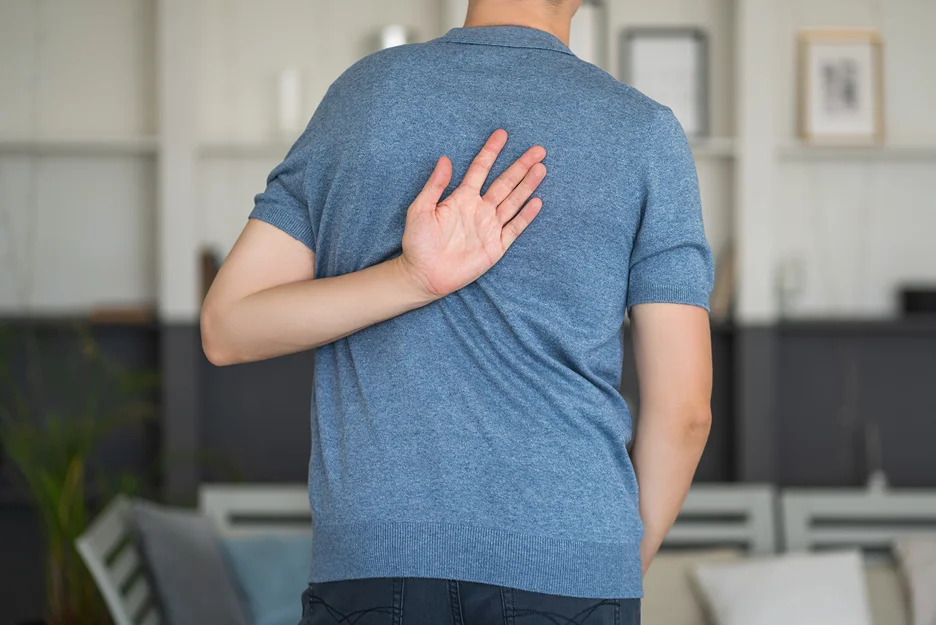End agony after coughing fits. Learn why back pain is happening and how to ease it quickly.
Back pain from coughing – we’ve all experienced it at some point. But is it normal or a sign of something more serious? Get to the root causes of this nagging health nuisance and unlock simple yet effective remedies.
Expert insights from Kaly lay out everything you need to know about cough-induced back pain.
Can a Cough Cause Back Pain?

Yes, coughing can lead to back pain by overworking back muscles, compressing spinal joints and discs, and aggravating conditions like arthritis according to Kaly spine specialists.
For those with pre-existing spinal conditions like arthritis, spinal stenosis, or herniated discs, the physical act of coughing can irritate the affected areas. The motion and pressure generated by coughing fits can pinch nerves and inflame tissue around joints or compressed nerves. Kaly experts explain this often results in flare-ups of lower back pain during bouts of coughing.
Straining Muscles
Violent, repetitive coughing can simply overexert and fatigue the muscles along the back and core. Much like an intense workout, coughing essentially forces the back to work beyond its limits, overworking the muscles.
This excessive strain can cause painful tightness, spasms, or minor tears, especially in the upper and middle back muscles.
Increasing Spinal Compression
The physical act of coughing applies increased pressure and load onto the spine and its delicate discs and joints. As the upper body hunches forward with each cough, this motion transfers pressure through the spine, forcing it beyond its normal range.
Kaly specialists advise this action can compress or overload the discs and joints, placing excess strain, particularly on the lower back.
Our specialists provide proven relief from cough-related back discomfort. Book a consult today.
What Causes Pain in the Lower Back with Cough?
Lower back pain with coughing is often caused by aggravating existing spinal conditions like herniated discs or inflicting new strains on muscles and ligaments according to Kaly’s back specialists.
Aggravating Existing Lower Back Conditions
- Herniated Discs – Coughing increases pressure inside spinal discs, which can worsen existing disc herniations in the lower spine.
- Spinal Stenosis – The narrowing of the lower spinal canal is aggravated by coughing as it further compresses the nerves.
- Old Injuries – Weakened areas in the lower back from prior strains or fractures are vulnerable to re-injury from coughing.
Causing New Lower Back Strains
- Muscle Strains – Sudden, forceful coughs can overstretch muscles and ligaments in the lower back, causing painful sprains.
- Sciatic Nerve – Coughing may irritate the sciatic nerve, causing pain to radiate down the legs.
- Increased Pressure – The physical act of coughing exerts additional pressure on the lower back’s discs, joints, and ligaments.
Risk Factors for Lower Back Pain
- Pregnancy – Extra weight and hormonal changes stress the lower spine, worsened by coughing.
- Excess Weight – Extra pounds place more strain on the lower back when coughing.
- Poor Posture – Slouching and hunching over predisposes the lower back to injury when coughing.
Can Mid Back Pain Be a Result of Persistent Coughing?
Yes, chronic, repeated bouts of coughing can commonly lead to pain in the middle back region.
The repetitive contractions from frequent coughing episodes place excessive strain on the ribs, muscles, and costovertebral joints along the thoracic spine. This often results in painful inflammation or muscle strains.
A study in the European Spine Journal found that people with severe sciatica were more likely to experience back pain when coughing due to herniated discs putting pressure on the sciatic nerve.
Additionally, the hunching motion of the upper body during coughing shifts pressure and load onto the middle back. In those with pre-existing spinal injuries, this can compress discs and nerves, causing irritation.
In rare cases, Kaly experts explain severe chronic coughing could potentially lead to small fractures in the vertebrae or ribs.
Can a Cough with Back Ache Be a Symptom of a Serious Condition?

Yes, cough with back pain can potentially indicate lung infections, cancer, blood clots or spinal problems, requiring prompt medical evaluation according to back specialists.
While most cases of cough-related back ache are benign, Kaly specialists caution it can sometimes indicate an acute medical problem that requires evaluation.
Potentially Serious Lung Conditions
- Pneumonia – This lung infection causes severe coughing, fever, and sharp back pain from lung inflammation.
A COVID-19 study describes a case of COVID-19 pneumonia presenting with back pain and night sweats. It suggests back pain can be an early symptom of lung infections like pneumonia before respiratory symptoms appear.
- Lung Cancer – According to WebMD, back pain affects up to 25% of lung cancer patients as tumors spread to bones or compress nerves.
- COPD Exacerbations – Flare-ups of this chronic lung disease provoke coughing and back pain from poor posture.
Other Concerning Causes
- Pulmonary Embolism – Blood clots in lungs cause sudden chest pain and coughing with associated back ache.
- Spinal Infection – Abscesses or infections on the spine cause severe back pain made worse by coughing.
A spinal tuberculosis review paper reports that back pain aggravated by coughing is a common early symptom, resulting from inflammation and nerve compression.
- Heart Attack – Upper back pressure is a symptom that can be provoked by coughing.
Seek prompt medical care for coughing with back pain if you have:
- Trouble breathing or chest pain
- Fever and unusual sputum
- Unexplained weight loss
- Back pain that worsens at night
How to Get Relief from Upper Back Pain Caused by Coughing?

Relieving upper back pain from coughing involves medications like NSAIDs, hot/cold therapy, targeted exercises, supportive braces, and proper posture according to our specialists.
Medications for Pain Relief
- NSAIDs like ibuprofen reduce inflammation and inhibit pain pathways.
- Acetaminophen increases pain thresholds in the central nervous system, as evidenced by the findings in this PMC study.
- Combining the two medications can provide greater pain relief than either alone.
Hot and Cold Therapy
- Ice packs constrict blood vessels, reducing swelling and nerve sensitivity.
- Heating pads relax muscles and stimulate healing blood flow.
- Alternating heat and cold often works best to ease spasms.
Exercises To Support the Upper Back
- Targeted strength training improves spinal muscle stability.
- Gentle stretching enhances flexibility and relaxes tense tissues.
- Tai Chi and yoga integrate both strengthening and stretching.
Additional Tips for Relief
- Wear a supportive back brace to minimize spinal strain from coughing.
- Maintain proper upright posture rather than hunching over.
- Get adequate rest to allow recovery between coughing fits.
By combining medications, hot/cold therapy, targeted exercises, braces, and posture corrections, optimal relief can be achieved for cough-related upper back discomfort.
Tired of coughing back pain? Kaly finds top local spine specialists for you! Search now!
